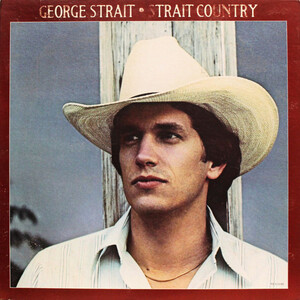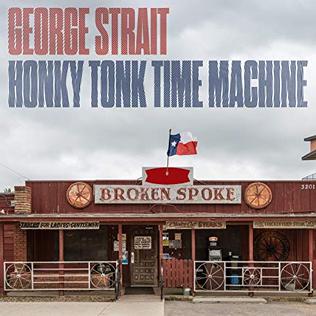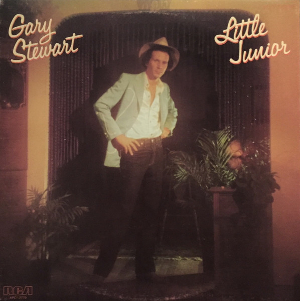Gary Ronnie Stewart was an American musician and songwriter, known for his distinctive vibrato voice and his outlaw country sound influenced by southern rock. At the height of his popularity in the mid-1970s, Time magazine described him as the "king of honkytonk." He had a series of country chart hits from the mid- to late 1970s, the biggest of which was "She's Actin' Single ", which topped the U.S. country singles chart in 1975.

John Bush Shinn III was an American country music singer, songwriter, and musician. Nicknamed the "Country Caruso", Bush was best known for his distinctive voice and for writing the song "Whiskey River", a top 10 hit for himself which also became the signature song of fellow country artist Willie Nelson. He was especially popular in his native Texas.

Strait Country is the debut studio album by American country music artist George Strait, released on September 4, 1981, by MCA Records. The album's traditional country music approach—a mix of Texas honky tonk and the Bakersfield sound—presented a sharp contrast to the dominating trends within country music at that time. The album includes the singles "Unwound", "Down and Out", and "If You're Thinking You Want a Stranger ". The album peaked at number 26 on the US Billboard Top Country Albums chart. Strait Country has been certified platinum by the RIAA. The album was one of the first to be recorded and mixed digitally.

Shadowland is the debut solo album by k.d. lang, released in 1988. The album included her collaboration with Kitty Wells, Loretta Lynn and Brenda Lee on "Honky Tonk Angels' Medley" and was produced by Owen Bradley, who produced Patsy Cline's best-known work.

Elvis Country is the thirteenth studio album by American singer and musician Elvis Presley, released on RCA Records in January 1971. Recorded at RCA Studio B in Nashville, it reached number 12 on the Billboard 200. It peaked at number six in the United Kingdom, selling over one million copies worldwide. It was certified Gold on December 1, 1977, by the Recording Industry Association of America.

Hungry Again is the thirty-fifth solo studio album by American singer-songwriter Dolly Parton. It was released on August 25, 1998, by Decca Records and Blue Eye Records. The album was produced by Parton and her cousin, Richie Owens. It is seen as a predecessor to Parton's critically acclaimed bluegrass trilogy, The Grass Is Blue, Little Sparrow, and Halos & Horns.

Lonesome, On'ry and Mean is a studio album by American country music artist Waylon Jennings, released on RCA Victor in 1973. It was, after Good Hearted Woman and Ladies Love Outlaws, the third in a series of albums which were to establish Jennings as one of the most prominent representatives of the outlaw country movement. Like its successor, Honky Tonk Heroes, the album is considered an important milestone in the history of country music. It represented the first of Jennings' works produced and recorded by himself, following his fight for artistic freedom against the constraints of the Nashville recording establishment.

This Time is a studio album by American country music artist Waylon Jennings, released on RCA Victor in 1974, at the peak of the outlaw country movement. It was produced by Jennings and Willie Nelson.

Wanted! The Outlaws is a compilation album by Waylon Jennings, Willie Nelson, Jessi Colter, and Tompall Glaser, released by RCA Records in 1976. The album consists of previously released material with four new songs. Released to capitalize on the new outlaw country movement, Wanted! The Outlaws earned its place in music history by becoming the first country album to be platinum-certified, reaching sales of one million.

The Troublemaker is the 20th studio album by country singer and songwriter Willie Nelson. When Nelson refused to sign an early extension of his contract with RCA in 1972, the label decided not to release any further recordings. Nelson hired Neil Reshen as his manager, and while Reshen negotiated with RCA, Nelson moved to Austin, Texas, where the ongoing hippie music scene at the Armadillo World Headquarters renewed his musical style. In Nashville, Nelson met producer Jerry Wexler, vice president of Atlantic Records, who was interested in his music. Reshen solved the problems with RCA and signed Nelson with Atlantic Records as their first country music artist.
"There's a Honky Tonk Angel (Who'll Take Me Back In)" is a song best known for the 1974 recording by American country music artist Conway Twitty, who took it to number 1 on the Hot Country Singles chart. The song was written by Troy Seals and Denny Rice and originally released on Troy Seals' 1973 debut album Now Presenting Troy Seals.
"I See the Want To in Your Eyes" is a song written by Wayne Carson. The song was first recorded by honky-tonk singer Gary Stewart and appeared on his 1975 album Out of Hand. American country music artist Conway Twitty heard Stewart's version on the radio and decided to record it. Twitty's version was released in July 1974 as the second single from the album I'm Not Through Loving You Yet. The song was Twitty's 11th number one on the country chart. The single stayed at number one for two weeks and spent a total of 13 weeks on the chart.
"She's Actin' Single (I'm Drinkin' Doubles)" is a song written by Wayne Carson, and recorded by American country music singer Gary Stewart. It was released in March 1975 as the third and final single from the album Out of Hand. The song was Stewart's third top ten hit on the country chart and his only song to hit number one. The single stayed at number one for a single week and spent a total of nine weeks within the top 40.

Songs I'll Always Sing is a two-record compilation album by American country music singer and songwriter Merle Haggard, released in 1977. It reached No. 15 on the US Country Charts. The album collects many of Haggard's best known recordings during his successful run at Capitol Records, including nine of his twenty-four No. 1 hits, dating back to 1966.

20 of the Best is a compilation album by American country music singer and songwriter Gary Stewart released in 1984 by RCA Records. In the period 1973 to 1983 Stewart enjoyed over twenty US Billboard country hits with RCA, including three duets with label-mate Dean Dillon. The tracks on this album spent over two hundred and ten weeks in the Billboard Country Charts and the track list includes a number of top-twenty successes.

Platinum is the fifth studio album by American country music singer and songwriter Miranda Lambert. It was released on June 3, 2014, by RCA Nashville.

Honky Tonk Time Machine is the thirtieth studio album by American country music artist George Strait. It was released on March 29, 2019, via MCA Nashville. The album's first single, "Every Little Honky Tonk Bar", was released to radio on February 11, 2019.

Brand New is an album by the American musician Gary Stewart, released in 1988. It was regarded as a comeback album; Stewart had spent years dealing with personal issues. The first single was "Brand New Whiskey".

Little Junior is an album by the American musician Gary Stewart, released in 1978. It peaked at No. 35 on Billboard's Top Country Albums chart. The first single was "Whiskey Trip". Stewart supported the album with a North American tour.
Roy Dea was a record producer He produced mainly Country artists which resulted in a good amount of hits. In his early period, he did produce some r&b recordings.














